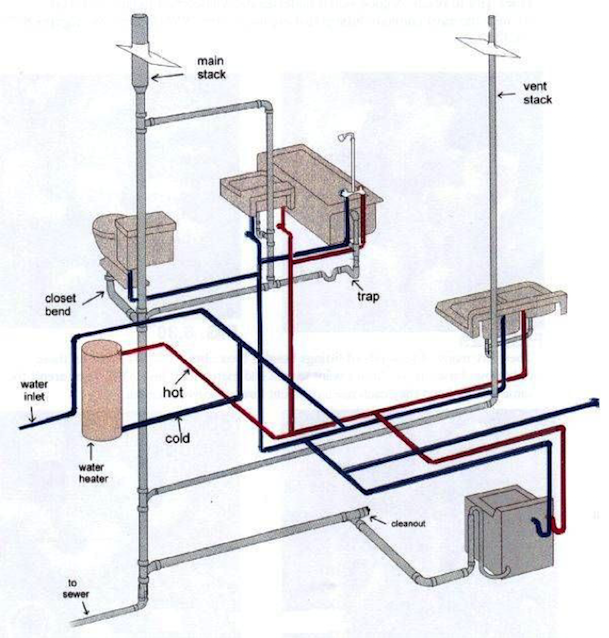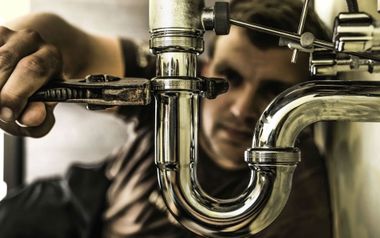On this page underneath you'll find a good deal of dependable material concerning Plumbing Installation 101: All You Need to Know.

Recognizing exactly how your home's pipes system functions is important for every single property owner. From delivering tidy water for alcohol consumption, cooking, and showering to safely getting rid of wastewater, a well-maintained plumbing system is crucial for your family's health and wellness and convenience. In this thorough guide, we'll explore the intricate network that comprises your home's plumbing and deal tips on upkeep, upgrades, and managing typical concerns.
Intro
Your home's pipes system is more than just a network of pipes; it's a complicated system that guarantees you have accessibility to clean water and efficient wastewater removal. Knowing its components and how they work together can aid you protect against costly repair work and make certain everything runs efficiently.
Fundamental Components of a Plumbing System
Pipelines and Tubes
At the heart of your pipes system are the pipes and tubes that bring water throughout your home. These can be made from numerous products such as copper, PVC, or PEX, each with its benefits in regards to durability and cost-effectiveness.
Fixtures: Sinks, Toilets, Showers, and so on.
Components like sinks, bathrooms, showers, and bathtubs are where water is made use of in your house. Recognizing exactly how these fixtures connect to the plumbing system helps in detecting problems and planning upgrades.
Valves and Shut-off Factors
Valves control the circulation of water in your pipes system. Shut-off shutoffs are crucial during emergencies or when you need to make repairs, enabling you to separate parts of the system without disrupting water flow to the entire residence.
Water Supply System
Main Water Line
The major water line links your home to the community supply of water or a private well. It's where water enters your home and is distributed to numerous components.
Water Meter and Pressure Regulatory Authority
The water meter measures your water usage, while a stress regulator makes certain that water flows at a risk-free stress throughout your home's pipes system, avoiding damages to pipelines and fixtures.
Cold Water vs. Hot Water Lines
Understanding the distinction between cold water lines, which supply water straight from the main, and hot water lines, which carry warmed water from the hot water heater, assists in fixing and preparing for upgrades.
Water drainage System
Drain Pipes Piping and Traps
Drain pipelines lug wastewater far from sinks, showers, and toilets to the drain or septic tank. Traps prevent drain gases from entering your home and additionally catch particles that can cause obstructions.
Ventilation Pipes
Ventilation pipes allow air into the water drainage system, stopping suction that might slow drainage and cause catches to vacant. Appropriate ventilation is vital for preserving the stability of your plumbing system.
Significance of Appropriate Drainage
Ensuring correct water drainage avoids back-ups and water damage. Consistently cleaning drains pipes and preserving traps can stop costly repairs and prolong the life of your plumbing system.
Water Heating System
Sorts Of Water Heaters
Water heaters can be tankless or standard tank-style. Tankless heating units warmth water on demand, while tanks store heated water for instant usage.
Upgrading Your Pipes System
Reasons for Updating
Updating to water-efficient fixtures or changing old pipes can improve water quality, minimize water costs, and raise the value of your home.
Modern Pipes Technologies and Their Advantages
Explore innovations like wise leakage detectors, water-saving bathrooms, and energy-efficient hot water heater that can save cash and reduce environmental impact.
Price Factors To Consider and ROI
Determine the in advance costs versus lasting savings when thinking about pipes upgrades. Lots of upgrades spend for themselves via minimized energy costs and less repair work.
How Water Heaters Link to the Plumbing System
Comprehending how water heaters link to both the cold water supply and hot water circulation lines aids in diagnosing problems like insufficient warm water or leaks.
Upkeep Tips for Water Heaters
Frequently flushing your water heater to get rid of debris, inspecting the temperature level setups, and checking for leakages can extend its life expectancy and enhance power performance.
Usual Plumbing Concerns
Leakages and Their Reasons
Leaks can happen because of maturing pipelines, loosened installations, or high water stress. Dealing with leakages immediately protects against water damages and mold and mildew development.
Clogs and Obstructions
Clogs in drains pipes and commodes are usually brought on by flushing non-flushable items or a buildup of oil and hair. Using drain screens and being mindful of what goes down your drains can prevent obstructions.
Indications of Plumbing Issues to Look For
Low water stress, slow-moving drains, foul odors, or unusually high water bills are indications of possible pipes troubles that must be resolved promptly.
Plumbing Upkeep Tips
Regular Evaluations and Checks
Schedule yearly pipes evaluations to catch issues early. Seek indicators of leaks, rust, or mineral buildup in faucets and showerheads.
DIY Upkeep Tasks
Simple jobs like cleansing tap aerators, looking for commode leakages utilizing dye tablet computers, or insulating exposed pipes in cold climates can stop significant pipes problems.
When to Call a Professional Plumbing Technician
Know when a pipes problem requires professional proficiency. Attempting complex repairs without appropriate knowledge can lead to even more damages and greater repair prices.
Tips for Decreasing Water Use
Straightforward routines like taking care of leaks promptly, taking much shorter showers, and running full loads of laundry and recipes can save water and lower your energy expenses.
Eco-Friendly Plumbing Options
Think about sustainable pipes products like bamboo for floor covering, which is durable and environmentally friendly, or recycled glass for countertops.
Emergency situation Preparedness
Actions to Take Throughout a Plumbing Emergency situation
Know where your shut-off valves lie and exactly how to turn off the water in case of a ruptured pipeline or significant leakage.
Relevance of Having Emergency Get In Touches With Handy
Maintain contact details for regional plumbing professionals or emergency situation solutions readily available for quick response throughout a plumbing dilemma.
Ecological Influence and Conservation
Water-Saving Components and Appliances
Mounting low-flow faucets, showerheads, and bathrooms can significantly decrease water use without giving up performance.
Do It Yourself Emergency Fixes (When Appropriate).
Temporary solutions like making use of duct tape to patch a dripping pipeline or placing a container under a trickling tap can reduce damages till a professional plumbing gets here.
Final thought.
Recognizing the anatomy of your home's plumbing system encourages you to maintain it successfully, saving time and money on fixings. By following regular maintenance regimens and remaining informed about modern-day pipes innovations, you can guarantee your pipes system operates successfully for several years ahead.
The Anatomy of Your Home s Plumbing System
Understanding the anatomy of your home s plumbing system is essential for any homeowner. It not only helps in identifying potential issues but also facilitates effective communication with professionals when repairs or upgrades are needed. Your home s plumbing system is more than just pipes and faucets; it s a complex network that ensures the efficient and hygienic flow of water in and out of your house. In this blog, we ll dissect the crucial components of your home s plumbing system. For those in Antelope Valley, Brock Plumbing is your trusted partner for all your plumbing needs, ensuring your system functions smoothly and efficiently.
Water Supply System
Main Water Line: This is where your home s plumbing system begins. The main water line connects your home to the public water supply or a private well. Pipes and Shut-off Valves: Pipes distribute water throughout your home. Shut-off valves are crucial for controlling the flow of water and making repairs without shutting off the entire system. Drainage System
Drain Pipes: These pipes carry waste and water away from sinks, toilets, and showers. Vents: Vents allow sewer gases to escape and help maintain proper pressure in the drainage pipes, ensuring efficient flow of wastewater. Traps: Every fixture has a trap, a U-shaped pipe that holds water and prevents sewer gases from entering your home. The most common is the P-trap under sinks. Fixtures and Appliances
Fixtures and appliances are the most interacted with parts of your plumbing system. They include sinks, toilets, showers, dishwashers, and washing machines. Each fixture and appliance has its own supply and drainage connection, ensuring they receive clean water and can dispose of wastewater effectively.
Water Heating System
Your water heater is a crucial component, providing hot water to various fixtures and appliances in your home. It can be tank-based or tankless, with each type having its own set of advantages and maintenance requirements. Regular maintenance is essential to ensure efficient operation and extend the lifespan of the unit.
Sump Pump
In areas prone to flooding or with high water tables, a sump pump is an essential part of the plumbing system. It s installed in the lowest part of your basement or crawlspace and pumps out water that accumulates, preventing flooding and protecting your home from water damage.
Septic System
Homes that are not connected to a municipal sewer system have a septic system and an underground wastewater treatment structure. Understanding how to maintain your septic system is crucial to prevent backups, odors, and early system failure.
Conclusion
Your home s plumbing system is a complex and essential network, ensuring the efficient and hygienic flow of water in and out of your property. Understanding its key components helps in maintaining it properly and identifying issues before they escalate into major problems. For residents in Antelope Valley, Brock Plumbing is dedicated to providing top-notch services, ensuring that every part of your plumbing system is in perfect working order. Trust our team of professionals to handle all your plumbing needs, ensuring your home remains comfortable, safe, and well-maintained.
https://brockplumbinganddrains.com/blog/the-anatomy-of-your-homes-plumbing-system/

Do you enjoy more info about Understanding Your Home's Plumbing Anatomy? Make a remark directly below. We would be glad to know your feelings about this piece. Hoping that you come back again in the future. If you appreciated our blog post please be sure to share it. I praise you for your time. Kindly check up our site back soon.
At This Website